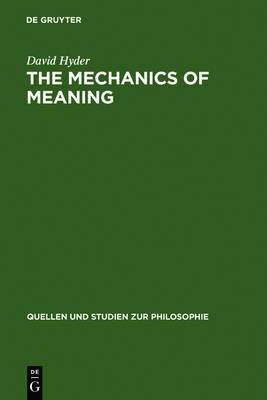Quellen und Studien zur Philosophie
2 primary works
Book 57
This analysis of Wittgenstein's concept of a Spielraum, in which the author approaches the Tractatus Logico-philosophicus both systematically and from the perspective of the history of philosophy and knowledge, opens up a new and important perspective in Wittgenstein research.
In establishing unexpected cross-connections between physics, the theory of perception, and logic, Hyder also makes a valuable contribution to the history of 19th century science. In particular, the links he establishes between early sensory physiology and the logicism of Russell and Frege yield a sharper and more plausible account of the notion of a "space" of possible meanings than has hitherto been available in the secondary literature. In showing this notion to be a formal precursor to that of a language game, the study also provides important pointers for the interpretation of Wittgenstein's late work.
In establishing unexpected cross-connections between physics, the theory of perception, and logic, Hyder also makes a valuable contribution to the history of 19th century science. In particular, the links he establishes between early sensory physiology and the logicism of Russell and Frege yield a sharper and more plausible account of the notion of a "space" of possible meanings than has hitherto been available in the secondary literature. In showing this notion to be a formal precursor to that of a language game, the study also provides important pointers for the interpretation of Wittgenstein's late work.
Book 69
This book offers a new interpretation of Hermann von Helmholtz’s work on the epistemology of geometry. A detailed analysis of the philosophical arguments of Helmholtz’s Erhaltung der Kraft shows that he took physical theories to be constrained by a regulative ideal. They must render nature “completely comprehensible”, which implies that all physical magnitudes must be relations among empirically given phenomena. This conviction eventually forced Helmholtz to explain how geometry itself could be so construed. Hyder shows how Helmholtz answered this question by drawing on the theory of magnitudes developed in his research on the colour-space. He argues against the dominant interpretation of Helmholtz’s work by suggesting that for the latter, it is less the inductive character of geometry that makes it empirical, and rather the regulative requirement that the system of natural science be empirically closed.

